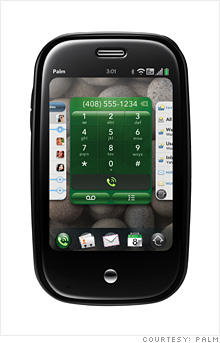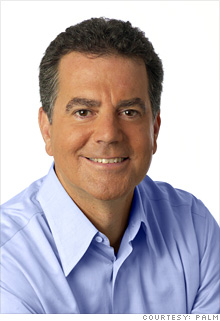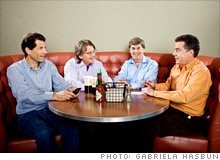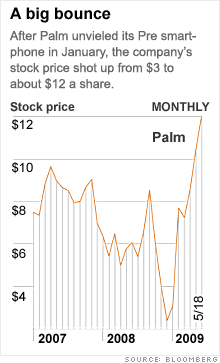|
|
The beleaguered handset maker says its new smartphone, the Pre, is an iPhone killer. Apple isn't laughing.
1 F6 }; z- ?& l. k3 t4 o/ ~' [) e' V5 o& ^1 t. x4 K
By Adam Lashinsky, editor at large May 26, 2009: 4:16 AM ET
* W6 C2 `! P' P8 U4 A, j# Z1 N2 s: D( c2 [ U8 i
5 I, E, C: _( J
(Fortune Magazine) -- Not much rattles Apple. Disciplined and focused, the company lavishes attention on its own elegant products and rarely deigns to discuss rivals. Yet here was Tim Cook, Apple's chief operating officer and designated stand-in for ailing CEO Steve Jobs, erupting during an earnings call in late January at the mere mention of a pip-squeak competitor. $ j! c: I! h- g Q/ U# m
The pest in question was Palm (PALM), the fallen pioneer of handheld digital organizers, which two weeks earlier had unveiled a new smartphone, the Palm Pre, to rave reviews. Not only did the Pre have features the iPhone couldn't match - snazzy multitasking, universal search, a drop-down keyboard - but it also showed the kind of multitouch screen technology that Apple popularized with the iPhone. Cook didn't try to hide his annoyance. "We're going to go after anybody" who rips off Apple's technology, he said. "We'll use whatever weapons we have at our disposal." 7 v( d0 L8 U5 ~9 Z& m2 t
, y( O% \( C4 ~, L9 o4 q0:00 /1:58Palm is back % X2 s( e0 t+ i, c
Open hostility from the world's hottest tech company cuts two ways for Palm, which says its years in the mobile business have produced plenty of patents of its own. On the plus side, Apple's obsession with the Pre makes it look as though the little company may have a winner on its hands. (Apple (AAPL, Fortune 500) is 25 times the size of Palm, which had $1.3 billion in 2008 revenue.)
' F1 O/ b$ q% R/ |2 yThen again, for an outfit betting its future on one product, few prospects are more daunting than a potential Apple lawsuit. And litigation is not Apple's only ammunition. Palm's financially shaky partner, Sprint Nextel (S, Fortune 500), will begin selling the Pre in the U.S. on June 6 for $200 with a two-year service contract. A few days later the world will hear Apple's response when it releases software upgrades and possibly new iPhones at lowered prices, which could inflict pain on Palm. It could also keep the upstart from becoming a major player along with Apple and Research in Motion (RIMM), maker of the BlackBerry, in the fast-growing smartphone market, where 139 million of the devices were sold worldwide last year, up 14% from 2007, according to Gartner. 2 w0 L& C4 w' B7 ^
There's far more at play here, though, than a simple David vs. Goliath yarn, Silicon Valley-style. True, Palm could be transformed if the Pre is a hit - the company's stock ran from $3 before the Pre's January unveiling to about $12 recently - or wiped out if it flops. But success is just as critical for Palm's largest investor, the quirky, high-profile private equity firm Elevation Partners, whose portfolio has suffered some setbacks.
& I$ H9 u3 U% u0 h Y& MIndeed, this spat goes way beyond competing companies and gadgets: It's deeply personal. One of Elevation's founding partners, Fred Anderson, was chief financial officer of Apple before retiring in 2004. He became embroiled in a scandal over backdated stock options at Apple and reached a settlement in 2007 with the SEC in which he admitted no wrongdoing. Anderson publicly pointed the finger at Steve Jobs. Apple's board said Jobs did nothing wrong. Yet it was right around the time of his settlement that Anderson had the bright idea of recruiting Jonathan Rubinstein to Palm. Rubinstein was an acolyte of Steve Jobs' for nearly two decades and was the executive acclaimed as the savior of the Macintosh and the father of the iPod.
5 h! U- l' N2 j, M% xBut wait, there's more. Palm has been raiding Apple's ranks of engineers and executives, just as Apple has done to Palm for years. And a rock star also figures in the mix. U2's Bono, a co-founder of Elevation (named for a U2 song), is a friend of Jobs' and helped smooth the way with record companies before the launch of the iTunes Music Store in 2003.
2 W5 W0 N0 h' u5 Q& fEven without the personalities involved, Palm's Pre against Apple's iPhone would be a decent tale of corporate rivalry. Layer in the animosities, hurt feelings, and potential for retribution, and it's a story of unusually high drama in the land of pocket protectors. Oh, and there's an undeniably cool product in the picture, which, if it's as good as its previews suggest, has the potential to shake up an already crowded and fast-growing industry.
: d. h Z( t# q; K8 w***
% Y) {5 a' i$ R$ p6 g3 m
) \2 r7 E* R% o8 U' M$ S | . k4 R+ G7 X& H0 s0 [$ F) U
 | | The Palm Pre retails for $200 with a two-year Sprint contract. It works on a 3G network and has a color touchscreen and a drop-down keyboard. |
! S1 X1 F2 T) e7 c& k% o
A SMARTER PHONE?! S: n v+ w- R( h( i7 s+ ~+ L
/ k+ `5 C# J8 j: k+ ]6 S( J! S
The BlackBerry and iPhone dominate the U.S. market. Palm, however, believes its new Pre has cool features that will make consumers switch.: h1 B/ p5 B/ L
|. w/ ?) ? h- `+ w1. New brains1 W4 X8 }$ J8 N6 o S+ k$ v! { n
Pre's webOS operating system allows you to work with multiple applications open on your screen. No more switching in and out of apps.' ]3 f+ c0 _1 X4 a4 {) O+ V! Q/ [
2. Better contacts
* X5 b8 K& y% `/ m/ ]You can automatically pull friends' contact details from different applications, such as Outlook, Google, and Facebook, and see the info on your phone as one listing.
_/ h: E- i8 n& e8 D" R# b3. Time tracker
6 V. V& I4 ?1 C. U9 }( g- KThe Pre allows you to view your calendars on their own or layered together as a single view - combining work, family, friends, and sports team schedules. U8 q& r2 {$ ?3 j. A
4. Messaging center
9 [+ O4 p# @4 k5 M& l/ JYou can see all your conversations with a person in chat-style view, even if she started in IM and you want to reply in, say, text messaging.1 a2 F/ {% T+ b6 p- Z
( g5 l0 i: L2 T+ I. I
 | | Palm CEO Ed Colligan raided Apple for talent. |
) Y( d' Q# h' ?' ^, Q
 | | Palm's A-Team: (from left) Rubenstein, McNamee, Anderson and Colligan. |
- [9 [1 a. N( [, F7 ^" p : }3 h. L) o+ S. b+ V : }3 h. L) o+ S. b+ V
* Q& C6 h. E4 I) m' r |
2 D/ P% z6 ]# o' ?' B5 T4 \/ l. ` C) F; D4 F& f
In its heyday Palm sold the iPhone of its time, the Palm Pilot, which it introduced in 1996. That device was revolutionary, succeeding where Apple had failed with the Newton. By merging with Handspring in 2003, Palm became a leader in smartphones with its Treo, a combination cellphone/organizer/e-mail device. Yet by 2007, the year Apple launched the iPhone, Palm's products had lost their way. Its newest idea, a slimmed-down portable computer called the Foleo, fizzled even before being launched, despite being a prescient precursor to the latest all-the-rage product: the netbook computer.
& `- _+ j" `9 z- bBy necessity, Palm began to think about its next act. It started to develop a new operating system for smartphones, but knew the process would take up to two years. CEO Ed Colligan, a marketing exec who had moved from Handspring to Palm, had the idea of taking Palm private, a better environment for a company with declining revenues trying to nurture a new product. With private-equity fever sweeping the market, Colligan called his buddy Roger McNamee, a co-founder of Elevation Partners, beginning a conversation that by June 2007 had led to Elevation's announcement that it would invest $325 million for a 25% stake in Palm.
2 N7 ^. ?5 _4 Q' v$ pAs a financier, McNamee had been at the center of the tech industry for nearly three decades. First as a mutual fund manager for T. Rowe Price and then as a founder of the VC/hedge fund Integral Capital Partners, McNamee was a cheerleader for technology companies - and an unusual one. Not only does McNamee play in his own rock band, but he also used to keep a life-size doll of Grateful Dead leader Jerry Garcia in his office. He left Integral in 1999 to form one of the first buyout shops dedicated to tech deals, Silver Lake, which scored big by taking private and then flipping Seagate, the disk-drive maker. : t7 E7 Y* c E; {
A mercurial sort, McNamee got booted by his Silver Lake partners in 2003. Soon after, he hooked up with Bono to form Elevation. They recruited an eclectic team comprising Anderson, Electronic Arts executive John Riccitiello, and two younger partners with experience in private equity. The idea was to apply tech-industry smarts to media and entertainment companies on the theory that the looming digital remake of those businesses would produce unique investment opportunities.
. `+ ^0 e8 U- {( D* J& f8 b+ cUnfortunately for Elevation, which raised $1.9 billion, its timing was poor and its investment selection worse. Two of its first three investments were stinkers. Homestore.com (since renamed Move.com) was a scandal-plagued operator of real estate sites. Elevation invested in 2005, shortly before the bottom fell out of the real estate market.
7 l1 G" l! L- H" U$ O2 SIn 2006, Elevation bought a 40% stake in business publisher Forbes Media. Elevation hoped to win by investing heavily in the company's websites, but online ads have slowed along with those for print. McNamee, who recently resigned from the Forbes board, says, "The recent deterioration in web advertising poses a new challenge I am confident Forbes will overcome." (Fortune, of course, competes with Forbes.) |
|
 |Archiver|手机版|小黑屋|吹友吧
( 京ICP备05078561号 )
|Archiver|手机版|小黑屋|吹友吧
( 京ICP备05078561号 )